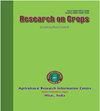Influence of sulphur and gypsum enriched municipal solid waste compost on sodicity reclamation and yield of wheat (Triticum aestivum)
Q3 Agricultural and Biological Sciences
引用次数: 0
Abstract
Soil sodicity leads to land deterioration that strongly alters the soil properties and consequently crop productivity. Sustainable management of municipal solid waste (MSW) is another emerging challenge. Combined use of MSW compost enriched with sulphur and gypsum can provide a convincing solution for ameliorating sodic soils and sustaining crop productivity. In this context, a controlled condition study was carried out on composting of MSW alone and its enrichment with elemental sulphur and gypsum followed by evaluation of the efficiency of MSW compost and products of its enrichment for amelioration of sodic soil. A pot experiment was conducted during 2019-20 to 2020-21 at Central Soil Salinity Research Institute, Karnal, Haryana, India on two levels of soil sodicity, namely, highly sodic soil with pH2 of 10.09 and moderate sodic soil with pH2 of 8.72 to evaluate the efficacy of sulphur and gypsum enriched MSW compost on sodic soil reclamation and sustainable yield production of wheat. Four treatments (MSW+ES, MSW+ES+G, MSW+G and MSW compost alone) were applied in different doses in sodic soils under consideration. MSW+ES and MSW+ES+G significantly reduced the soil pH2 up to 13.5 and 13.3%, respectively, Na+ up to 32 and 30% and enhanced grain yield about 44 and 37.2%, respectively, as compared to control (non-amended soil). Out of all amended doses, D3 (@300 g/15 kg soil) was found most effective in reducing pH2 and Na+ about 13.8 and 30.6% respectively. This study has proved that MSW enriched with sulphur can be used as an effective solution for improving soil physico-chemical properties and crop productivity of sodic soil.富硫、富石膏城市生活垃圾堆肥对小麦(Triticum aestivum)盐碱化及产量的影响
土壤碱度会导致土地退化,从而极大地改变土壤特性,进而改变作物生产力。城市固体废物的可持续管理是另一个新出现的挑战。富含硫和石膏的城市生活垃圾堆肥的联合使用可以为改善苏打土和维持作物生产力提供令人信服的解决方案。在此背景下,对城市生活垃圾单独堆肥及其元素硫和石膏富集进行了控制条件研究,然后评估了城市生活垃圾堆肥及其富集产物对苏打土改良的效率。2019-20年至2020-21年,在印度哈里亚纳邦卡纳尔中央土壤盐度研究所对两个土壤碱度水平进行了盆栽试验,即pH2为10.09的高钠土和pH2为8.72的中等钠土,以评估富含硫和石膏的MSW堆肥对钠土复垦和小麦可持续产量生产的效果。在所考虑的苏打土中,以不同的剂量施用了四种处理(MSW+ES、MSW+ES+G、MSW+G和MSW单独堆肥)。与对照(未改良土壤)相比,MSW+ES和MSW+ES+G显著降低了土壤的pH2,分别降低了13.5%和13.3%,Na+分别降低了32%和30%,粮食产量分别提高了约44%和37.2%。在所有修正剂量中,D3(300克/15公斤土壤)在降低pH2和Na+方面最有效,分别约为13.8%和30.6%。本研究证明,富含硫的MSW可以作为改善土壤理化性质和提高苏打土作物生产力的有效解决方案。
本文章由计算机程序翻译,如有差异,请以英文原文为准。
求助全文
约1分钟内获得全文
求助全文
来源期刊

Research on Crops
Agricultural and Biological Sciences-Soil Science
CiteScore
1.50
自引率
0.00%
发文量
93
审稿时长
1 months
期刊介绍:
The Research on Crops is a peer-reviewed journal publishing original research papers, review articles and short communications in English on all basic and applied aspects of crop sciences, agricultural water management, agro-climatology, agroforestry, agronomy, crop production, crop protection, cropping systems, food science & technology, genetics & plant breeding, horticulture, plant & soil science, plant biotechnology, plant nutrition, post-harvest management of crops, seed science, soil management & tillage, vegetables, weed science, agricultural engineering, agri-business, agricultural economics and extension, etc. The aim of the journal is to provide a forum for the scientific community to publish their latest research findings.
The manuscripts submitted for publication should not contain data older than 4 years on the date of submission.
The articles submitted for publication in this journal should not be submitted elsewhere simultaneously for publication in another journal. These should not carry any copyright material without prior permission of copyright holder.
The articles should present a complete picture of the investigation made and should not be split into parts.
There is no prescribed limit regarding the number of pages in case of full-length articles. However, the authors are advised to keep the length of their articles from 4 to 10 full printed pages of the journal.
The articles should be divided into the sub-sections: ABSTRACT, INTRODUCTION, MATERIALS AND METHODS, RESULTS AND DISCUSSION, CONCLUSIONS, and REFERENCES. Tables and figures should be appended separately at the end.
 求助内容:
求助内容: 应助结果提醒方式:
应助结果提醒方式:


